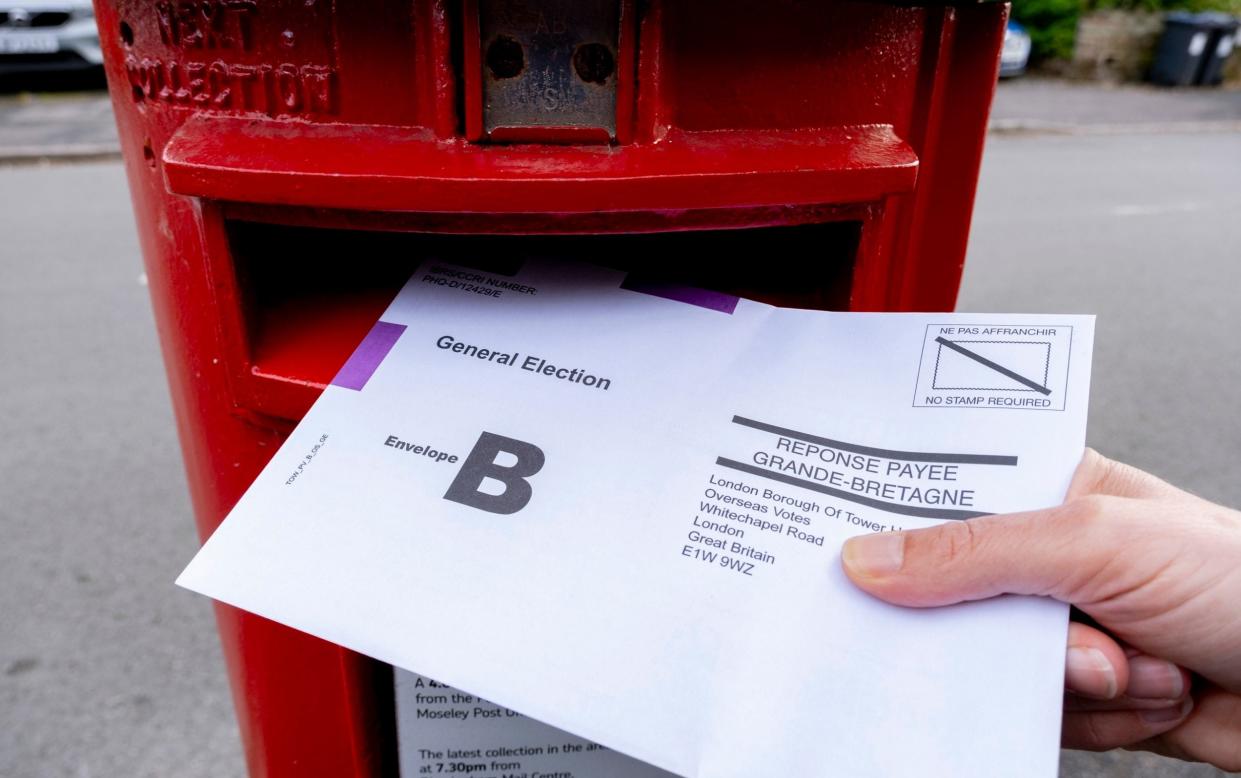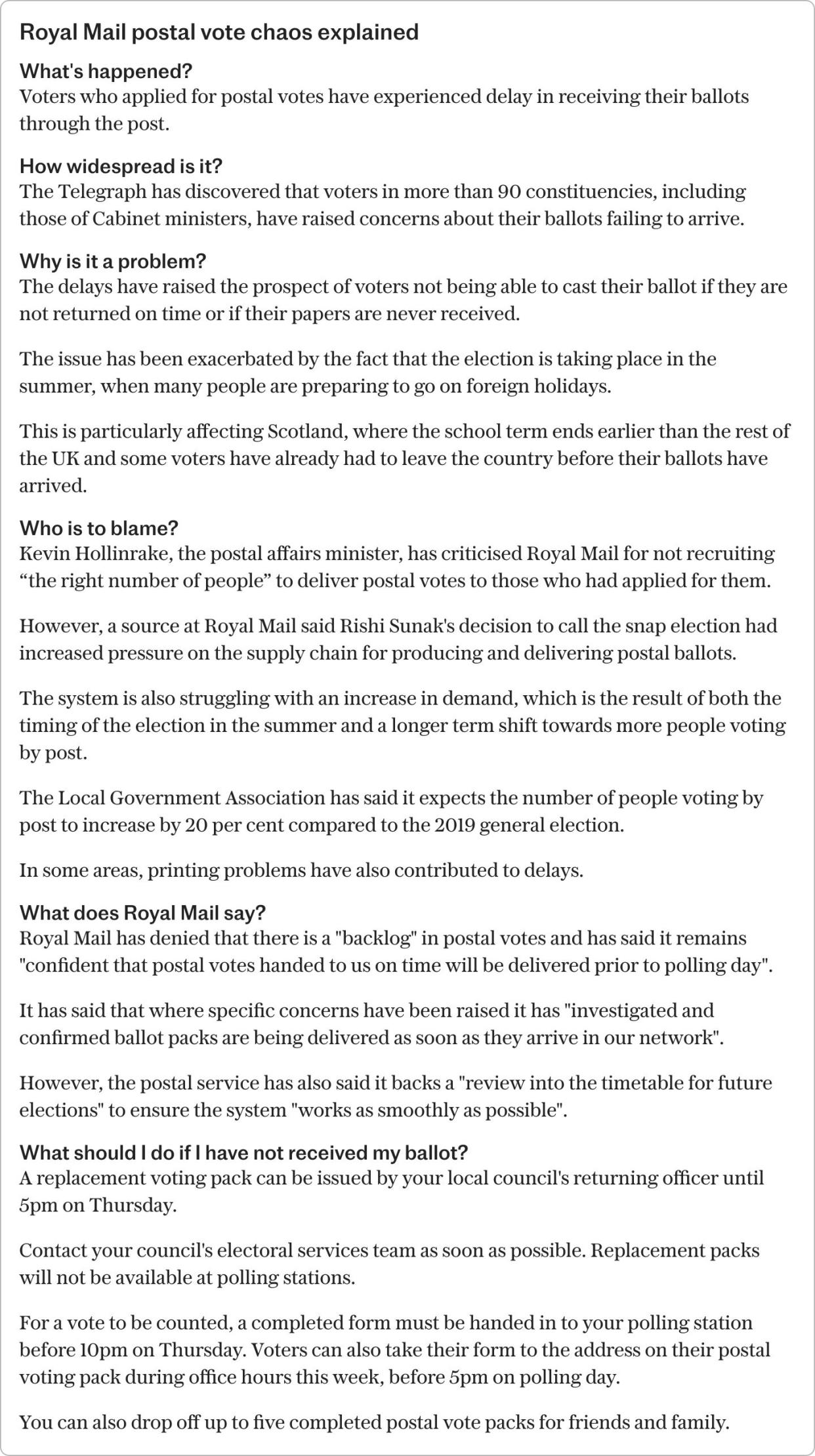Royal Mail blames snap election for postal vote delays

Royal Mail has blamed delays to postal votes on Rishi Sunak’s decision to call a snap election.
The company called for a “review into the timetable for future elections”, to make sure that the postal voting system “works as smoothly as possible”.
Mr Sunak said it was “right” that Royal Mail was investigating the concerns around delayed deliveries.
On Monday, The Telegraph revealed that voters in more than 90 constituencies – including those of Cabinet ministers – had raised concerns about their ballots failing to arrive.
Kevin Hollinrake, the postal affairs minister, criticised Royal Mail for not recruiting “the right number of people” to deliver postal votes to those who had applied for them.
However, a source at the postal service told The Telegraph on Tuesday that Mr Sunak’s decision to call the snap election had increased pressure on the supply chain for producing and delivering postal ballots.
In some instances, Royal Mail only received ballots on Saturday – leaving just a few days to deliver them ahead of the vote on Thursday.
The source also pointed to a sharp increase in the number of people choosing to vote by post given the proximity to the summer holiday period.
The increase in applications for postal votes is particularly pronounced in Scotland, where the school term ends earlier than the rest of the UK, meaning some voters had already left the country on holiday before their ballots had arrived. In Edinburgh alone, there has been a 42 per cent increase in applications to vote by post.
Across the UK, 21 per cent of people voted by post in the 2019 general election. The number of people voting by post is expected to increase by more than a million this year.
Despite the increase, a similar timescale has been used for administering postal votes this year as in 2019. Voters were given just under three weeks to apply for a postal vote between the dissolution of Parliament on May 30 and the deadline for applications of June 19.
As in 2019, the gap between the cutoff for applications and polling day is about two weeks.
A Royal Mail spokesman said: “We have no backlog of postal votes and, whilst we are not complacent, we remain confident that postal votes handed to us on time will be delivered prior to polling day.
“Where specific concerns have been raised, we have investigated and confirmed ballot packs are being delivered as soon as they arrive in our network.
“We would welcome a review into the timetable for future elections with all stakeholders to ensure that the system for printing and administering postal votes before they are handed to Royal Mail works as smoothly as possible.”
Hitting back at Mr Hollinrake, Royal Mail also indicated that the postal minister had not yet personally raised his concerns with the service despite his public criticism.
On Tuesday, Mr Sunak was asked during a visit to Banbury, Oxfordshire, whether he was worried about reports that some people may not be able to vote.
He told broadcasters: “It’s right that the Royal Mail have said that they will look at any concerns where they’re raised because, obviously, we want to make sure everyone can vote because this is an important election. In spite of what some people want others to believe, that it’s all a foregone conclusion, every vote matters.”
Sir Keir Starmer, the Labour leader, said on a campaign visit in Nottinghamshire: “We must do everything we collectively can to ensure that those ballot papers get to people, that they can fill them in and have the vote to which they are entitled so the country can move forward with the change that I hope will be delivered at this election.”
Stephen Flynn, the SNP’s Westminster leader, questioned Royal Mail’s denial of a backlog.
The Local Government Association said it supported a review of the “complex” and “overburdened” postal voting system.
A spokesman said: “Councils and electoral staff across the country have been doing their utmost to ensure the smooth running of this election and that people can vote.
“People voting by post are expected to have increased 20 per cent since the 2019 general election. This unprecedented increase adds more pressure to an already complex process and overburdened system.
“We are aware of reports of incidents where delays have happened. The postal vote system could benefit from review, and more could be done to support Royal Mail and printers to be ready to deliver elections.”
The Electoral Commission has confirmed that it will look at postal voting in a post-election review. Vijay Rangarajan, its chief executive, suggested the system had struggled in some areas with the turnaround after Mr Sunak called the election – but said about 6.7 million postal votes had already been sent.
“That’s better than previous elections,” he said. “At the moment, the printers have been working flat out, Royal Mail have been working really flat out, so have electoral administrators, to try to get postal votes out so everyone can vote.”

He said the last batches should have been delivered to people on Monday and Tuesday but that “there’s very little” that can be done if voters are already abroad.
Tom Brake, the director of the Unlock Democracy pressure group, said: “It is clear that the present election timetable does not work for postal voters, particularly those who live overseas.
“This year, the challenge of getting ballot papers to people on time was exacerbated by a patchy postal system and the recent introduction of other measures local authorities had to deal with, including photo voter ID and the extension of overseas citizens voting rights.
“It is too late to fix the problem for this election, but for future elections, technological alternatives to snail mail may need to be considered. These would be of particular assistance to overseas voters who will have been hit hardest by these problems.”
A spokesman for the Electoral Commission said: “Tens of thousands of postal votes were delivered over the weekend. We know local authorities and Royal Mail are working to get the final ones out as soon as possible.
The regulator said anyone who has not yet received their postal ballot pack should either request a replacement from their local authority or, if they have problems with posting it, to ask someone to hand it in on their behalf.
It added: “We recognise the pressures on the postal voting system due to the holiday season. We are continuing to provide advice and guidance to electoral services teams to support them with the postal voting process.
“Following the election, we will undertake research with voters and electoral administrators to understand their experiences at this poll.”



